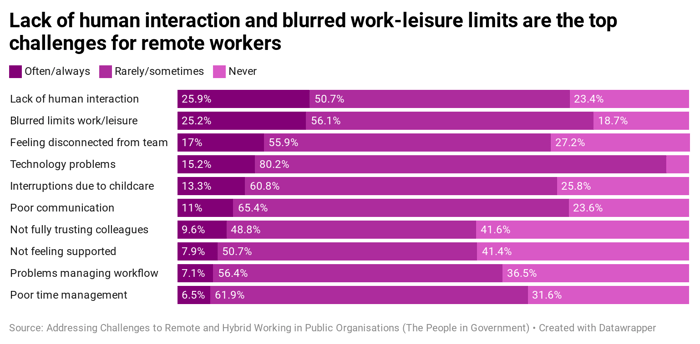Civil servants want hybrid working, report shows
The vast majority of civil servants are satisfied with remote and hybrid work arrangements (88.5%) and would like to continue working this way in the future, a new report has found.
The forced adoption of remote and hybrid working in the public sector during the pandemic is a “people management innovation that will reverberate for years to come”, according to the study by the People in Government Lab, a research centre part of the Blavatnik School of Government at the University of Oxford.
Findings from the report suggest that the widespread transition to flexible location work as a result of Covid-19 has had a strong positive impact on public servants’ wellbeing and productivity - although they also highlight the challenges of remote working arrangements.
The report, which gathers responses from public organisations in the UK, Brazil and Chile, collects the views of 1,350 UK civil servants from DWP, HMRC, Cabinet Office, DEFRA, MoD, and other departments.
"Hybrid working is here to stay"
According to the survey, 61.9% of UK civil servants said they are either very satisfied (61.9%) or satisfied (26.6%) with remote and hybrid work arrangements and want to continue working under this model, including full-time or at least three days per week of remote work. Only a few respondents said they were dissatisfied (4.9%) or very dissatisfied (1.8%).

The findings are consistent with those from a 2021 report, which showed that 97% of public servants would like to continue working from home post-pandemic, even if that is no longer the default option.
Remote and hybrid working have resulted in improved wellbeing for staff without a decrease in productivity, said Anna Smart, Organisational Design Lead at the London Borough of Camden.
"Overall, it has been really successful for us," Smart told Government Transformation. "Around three quarters of our staff have done at least some remote working since the start of the pandemic (it’s not possible for some community-based roles, such as Caretaking and Bus Driving). Many of our staff continue to work partly at home, but ‘hybrid’ is our new normal for most staff."
Smart added that developing the right culture of hybrid collaboration, ensuring that staff has access to the necessary technology and leadership that fosters trust and flexible ways of working have been key enablers for this success. More recently, Smart's team has been asking colleagues to come into the office at least once a week to maintain the connection to place and foster collaboration. However, this has posed new challenges.
"There are still some Covid fears, and for some colleagues who do particularly process-heavy work it is not yet clear why they ought to come into the office when they feel they can do their job well from home, also there are concerns about the cost of living and travel can be expensive for colleagues," Smart said. "We are working to make our workspaces places that people really want to come into, and to facilitate meaningful collaboration linked to purpose."
The benefits of digitally-enabled remote working were strongly felt even by teams that pre-pandemic favoured or heavily relied on in-person meetings. In the case of Tammy Noel, Deputy Director of Civil Service Organisation Development and Design at the Cabinet Office, switching to remote working during lockdown made her team discover new opportunities that technology could unlock, including the flexibility to bring stakeholders from different departments and communities quickly together thanks to video conference platforms.
“We were a team who very much relied on and loved being in the face-to-face space,” Noel said during a roundtable hosted by Government Transformation. “We did a lot of interventions working directly with clients or with our community that we felt were better in that physical environment. So when the pandemic hit, it was a big shock for us but we adapted very quickly and moved a lot of our interventions online and worked out ways to do that.”
Research by experience management company Qualtrics found that employees today demand better physical and digital workspaces, including the possibility of working remotely. “Hybrid working is here to stay and people want the technology to enable them to be effective, wherever they are,” said Daly Simon Daly, Employee Experience Strategist at Qualtrics. “They also need a very compelling reason to go into the office.”
Persisting challenges to remote working
But despite the overwhelmingly positive feedback from civil servants on the remote working experience, the People in Government Lab study has also highlighted two ongoing challenges of remote working that the public sector needs to address.
These included the lack of human interaction and blurred boundaries between work and personal time. Other issues arising from remote work reported by UK public sector workers and their international counterparts include feeling disconnected from the team, technical difficulties, and interruptions due to childcare.

To overcome these challenges, the authors of the report offer a series of regulatory and managerial recommendations. This includes a call for government to develop a regulatory framework on remote and hybrid working defining the different schemes of flexible working arrangements, employees’ and employers’ duties and remote and hybrid workers’ rights. Public organisations need to adopt manuals and policies to evaluate their organisational needs and define specific programmes and management tools.
But much of the continuing success of remote working will depend on management, and the report suggests the strengthening of leadership skills and team practices to ensure team collaboration and communication.
Other initiatives that public sector managers can introduce to ensure an effective remote working setting are enacting mechanisms to improve staff’s wellbeing, improving planning and time management skills, and ensuring that new team members, particularly younger ones, are properly supported and inducted into the organisation.
Also Read
- New Government Commercial Agency to centralise £400bn public procurement spend
- NAO chief urges Whitehall to pair AI with cost transparency to unlock government productivity
- Beyond the consultancy cycle: rethinking how the public sector builds capability
- Transforming public services: why people, partnerships, and tackling technical debt matter most




.png?width=600&name=Copy+of+wfh+video+blog+(1).png)
